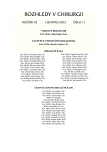-
Medical journals
- Career
Multiple endocrine neoplasia type 1 syndrome with special emphasis on pancreatoduodenal tumours – a case report analysis
Authors: K. Menclová 1,2; M. Ryska 1
Authors‘ workplace: Chirurgická klinika 2. LF UK a ÚVN Praha, přednosta: prof. MUDr. M. Ryska, CSc. 1; Fakulta vojenského zdravotnictví Univerzity obrany, Hradec Králové děkan: Plk. doc. MUDr. J. Páral, PhD. 2
Published in: Rozhl. Chir., 2013, roč. 92, č. 11, s. 625-633.
Category: Review
Overview
Introduction:
The syndrome of multiple endocrine neoplasia type 1 (MEN 1) is a relatively rare hereditary disease predisposing to a variety of tumours, some of which may be hormonally active. The main organs affected are the parathyroid, the pituitary and the pancreatoduodenal area. Despite the rarity of MEN 1, its occurrence is not negligible in clinical practice and the clinicians’ ignorance often leads to delayed diagnosis and inadequate treatment.Material and methods:
The aim of this review is to present contemporary literature on this issue, including the most controversial topic, i.e. recent modalities of treatment of pancreatoduodenal tumours, and to present a case report. The literature review was based on computer searches in PubMed and DynaMed.Discussion:
Pancreatoduodenal tumours associated with MEN 1 are relatively slow-growing neoplasias. The development of liver metastases is the main factor of long-term survival. The aim of surgical treatment is the stabilisation of the disease and the prevention of liver metastases. Radical surgical methods may lead to better biochemical curability. The extent of surgical intervention should be selected individually. We discuss our case report in the context of these findings.Conclusion:
Knowledge of the MEN 1 syndrome has its importance in the clinical practice. Further prospective studies will be needed to evaluate the effectiveness of treatment, especially for pancreatoduodenal tumours.Key words:
syndrome of multiple endocrine neoplasia (MEN) – Zollinger-Ellison syndrome – pancreatic neuroendocrine tumours
Sources
1. Brandi ML. Consensus: Guidelines for Diagnosis and Therapy of MEN Type 1 and Type 2. The Journal of Clinical Endocrinology & Metabolism 2001;86 : 5658–5671.
2. Waldman J, Langer P. Screening of Patiens with Multiple Endocrine Neoplasia Type 1 (MEN-1): A Critical Analysis of Its Value. World J Surg 2009;33 : 1208–1218.
3. Norton JA, Jensen RT. Resolved and Unresolved Controversies in the Surgical Management of Patiens With Zollinger-Ellison Syndrome. Ann Surg 2004;240 : 757–773.
4. Gibril F, Jensen RT. Multiple Endocrine Neoplasia Type 1 and Zollinger-Ellison Syndrome: A prospective study of 107 Cases and Comparison With 1009 Cases From the Literature. Medecine 2004;83 : 43–83.
5. Bartsch D, Rothmund M. Outcome of Duodenopancreatic Resections in Patiens With Multiple Endocrine Neoplasia Type 1. Ann Surg 2005;242 : 757–766.
6. Fendrich V, Langer P, Celik I, Bartsch DK, Zielke A, et al. An aggressive surgical approach leads to long-term survival in patients with pancreatic endocrine tumors. Ann Surg 2006;244 : 845–851
7. Norton JA, Jensen RT. Comparison of Surgical Results in Patiens With Advanced and Limited Disease With Multiple Endocrine Neoplasia Type 1 and Zollinger-Ellison Syndrome. Ann Surg 2001;234 : 495–506.
8. Zamrazil V. Neuroendokrinní tumory. Interní Med 2007;9 : 514–519.
9. Waldman J, Langer P. Fast-growing pancreatic neuroendocrine carcinoma in a patient with multiple endocrine neoplasia type 1: a case report. J Med Case Reports 2008;2 : 354.
10. Imamura M, Inoue N. Biochemically curative surgery for gastrinoma in multiple endocrine neoplasia type 1 patients. World J Gastroenterol 2011;14 : 1343–1353.
11. Tonelli F, Brandi ML. Pancreatectomy in Multiple Endocrine Neoplasia Type 1 – Related Gastrinomas and Pancreatic Endocrine Neoplasias. Ann Surg 2006;244 : 61–70.
12. Imamura M, Tobe T. Curative Resection of Multiple Gastrinomas Aided by Selective Arterial Secretin Injection Test and Intraoperative Secretin Test. Ann Surg 1989;210 : 710–716.
13. Kala Z, Svatoň R. Neuroendokrinní nádory pankreatu – pohled chirurga. Onkologie 2010;4 : 344–348.
14. Hlavsa J. Radiofrekvenční ablace neuroendokrinního nádoru pankreatu. Klin Onkol 2011;24 : 209–215.
15. Kooperativní skupina pro neuroendokrinní nádory [on line], dostupné na www.neuroendokrinni-nadory.cz.
16. Kianmanesh R, Belghiti J. Traitement chirurgical des tumeurs endocrines gastro-entéro-pancréatiques. Journal de chirurgie 2005;142 : 132–149.
17. Krysiak R, Okopień B. Atypical clinical manifestation of multiple endocrine neoplasia type 1 syndrome. Pol Arch Med Wewn 2009;119 : 175–179.
18. Sakurai A. Clinical features of insulinoma in patients with MEN 1: analysis of the database of the MEN Consortium of Japan. Endocrine Journal 2012;59 : 859–866.
19. European Neuroendocrine Tumor Society [on line], dostupné na www.enets.org.
Labels
Surgery Orthopaedics Trauma surgery
Article was published inPerspectives in Surgery

2013 Issue 11-
All articles in this issue
- Multiple endocrine neoplasia type 1 syndrome with special emphasis on pancreatoduodenal tumours – a case report analysis
- Laparoscopic lavage and drainage in the management of acute diverticulitis: Is it time to move on?
- Reconstruction of complex abdominal wall defects using the component separation technique
- Minimally invasive video-assisted operations for heart disease
- Heparin-induced thrombocytopenia in a patient with acute thrombosis, acute aortic dissection and acute lower limb ischaemia
- Difficult differential diagnosis of malignant melanoma – case reports
- Chest drainage – physiological and pathophysiological aspects and indications
- Chest drainage methods
- Chest drainage systems and the complications associated with drainage.
- Perspectives in Surgery
- Journal archive
- Current issue
- Online only
- About the journal
Most read in this issue- Chest drainage systems and the complications associated with drainage.
- Chest drainage methods
- Chest drainage – physiological and pathophysiological aspects and indications
- Reconstruction of complex abdominal wall defects using the component separation technique
Login#ADS_BOTTOM_SCRIPTS#Forgotten passwordEnter the email address that you registered with. We will send you instructions on how to set a new password.
- Career

